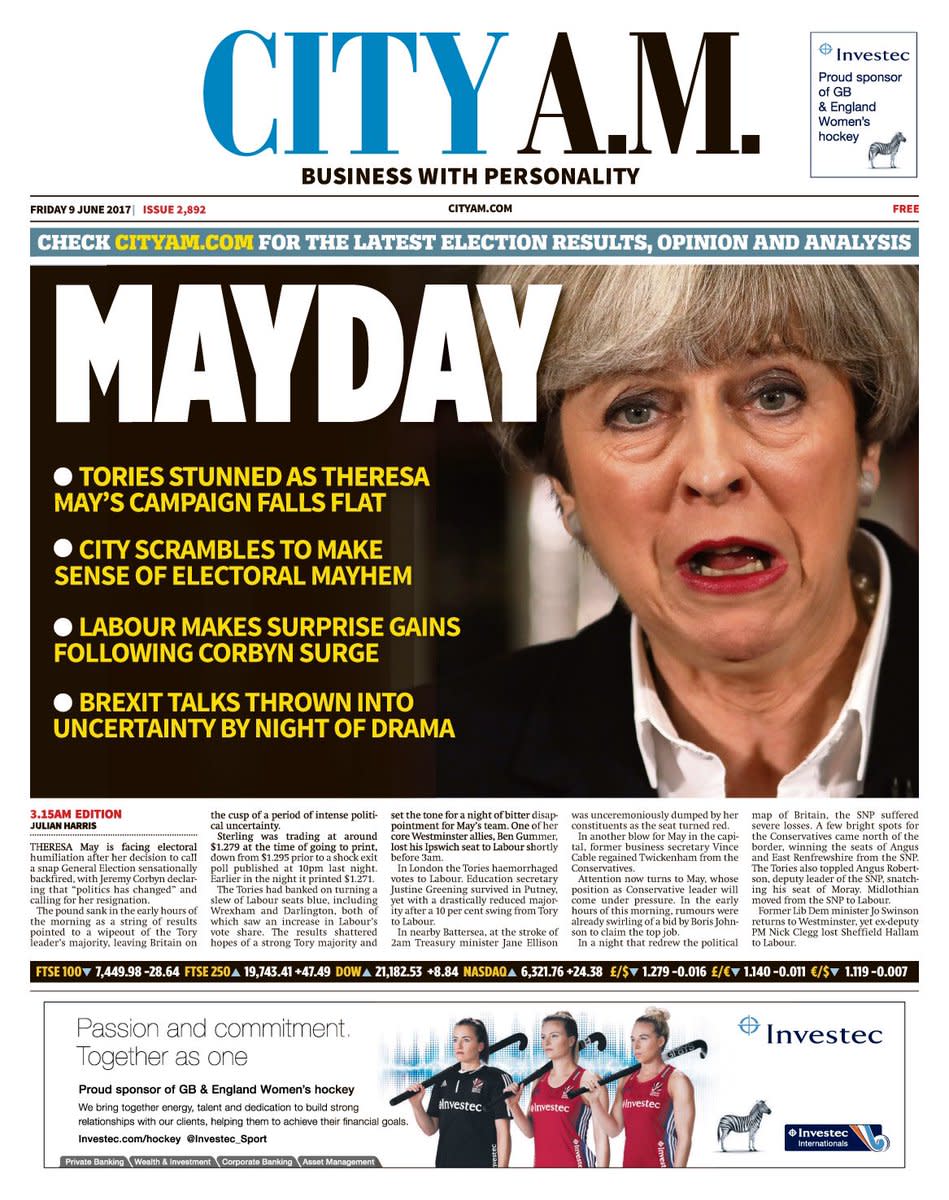May's election gamble doesn't pay off, sterling plunges

‘I went through absolute stress and mayhem. I couldn’t go out, because people were constantly on my back all the time’ – Cher
Whilst popular music stars – like Cher in the quote above – can hide at times of strife this is not a luxury offered to politicians and especially Prime Minister’s like Theresa May who called the election just over six weeks ago at a time of a significant opinion poll lead and closed the election without a direct Conservative Party Parliamentary majority.
All of this means the days of Parliamentary jockeying last seen by UK political watchers in the years before 2015 are inexorably back and questions of whether Theresa May can stay as UK Prime Minister are necessarily circulating.
Simply put, her political gamble in April has not paid off. May-hem indeed.
MORE: How the global markets reacted to UK General Election 2017 exit poll
MORE: Hung parliament confirmed: Sterling swings as markets react to ‘perfect storm of chaos’
From a financial markets perspective all of the above smacks of uncertainty for the UK’s domestic and external policies.
The biggest reaction inevitably came from the value of the British Pound which fell over 1.5% since the close of the American markets on Thursday.
Historically such a currency fall from the outcome of the lack of a clear majority government would reflect the fear that domestic policies would be caught in a political gridlock.
However, this election has larger, more external implications specifically on the issues of the Brexit negotiations.
Too much ink has been spilt already on the potential complexities, trials and tribulations of the Brexit negotiations…but the uncertain outcome of the General Election has added even further areas of debate.
Consensus at the time the election was called centred on how a bigger Conservative government majority would allow a softer Brexit on the basis the ‘get out of Europe at any cost’ politicians could be ignored now, however, the range of scenarios are even wider.
For me a softer, delayed Brexit is now even more likely given current opposition politicians favouring such an approach.
Any benefit from this however is threatened by the fear of domestic political change and potential gridlock including debate about whether the Prime Minister will resign and/or whether another General Election is required.
All of this has implications for UK equity and fixed income markets. A weak Pound helps the foreign currency earning sectors (such as the mining, energy, pharmaceutical and industrial sectors) and the immediate reaction by the UK stock market will be to favour such names over their more domestic centred peers in the retail, banking and building/construction sectors.
Overall, these ups and downs will mean the UK equity is less impacted than many think at face value but the performance mix between different shares is going to rise significantly.
The opportunities for brave individual share pickers will therefore actually go up rather than down. Understanding what you invest in and the reasons why will matter more than ever as the more domestic-centred shares are cheap but more uncertain.
Political tribulations are unlikely to have too much of an impact on interest rate policy as the independent Bank of England will – if anything – err on the side of caution at times of political strife. UK bonds may be perceived by some as a safe haven but their current low yields still provides very limited returns for investors.
Uncertainties and a lack of forward clarity are rarely good news for investors, especially as clear scope for another election before the end of the year is apparent.
It is certainly true that the financial markets backdrop that UK investors have seen over the last seven of eight years of strong gains and limited volatility is going to change.
Returns are probably going to be lower and uncertainties higher – and that’s even before the considerations of curve balls like minority governments or any aggression by European governments (foolishly in my view given the nascent nature of their own regional economic recovery).
Positively, however, all is not lost. I mentioned above the good likelihood now that the practical Brexit timescale will be pushed out.
Further, if in some form a coalition government can be formed, these current political uncertainties will fade a little.
Additionally, the immediate differences in performance between international-facing and domestic-centric shares will create opportunities for stock pickers. If you put all of this together there are opportunities for flexible and knowledgeable investors.
For Theresa May, the new day dawns with a feeling of May-hem. For individual investors it does not have to. As always the knowledgeable and sensibly brave investor will find ways to be rewarded.

 Yahoo Finance
Yahoo Finance 
